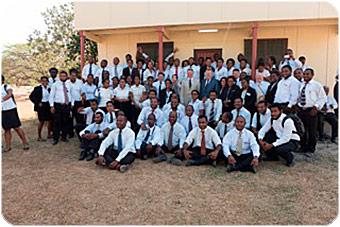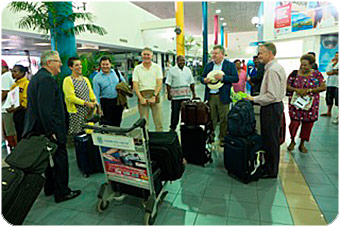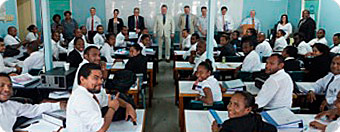The first week in September marked the inaugural Commercial Law, Litigation & Advocacy Workshop (CLLA Workshop) run in Port Moresby by a delegation representing the Queensland Bar Association. This AusAid funded program saw two judges, four silks and four junior barristers spend five days at the Legal Training Institute (LTI) in Papua New Guinea teaching eighty-one students about the principles and practice behind different areas of commercial law in that country.
This CLLA Workshop was the culmination of an idea that began in 2011 in a conversation between the Chief Justice of Papua New Guinea, Sir Salamo Injia, and Justice Logan of the Federal Court of Australia. Justice Logan was appointed to sit on the Supreme and National Courts of Papua New Guinea (PNG) in 2010 under a mutual agreement between the Australian and PNG governments. Sir Salamo, a strong advocate of legal reform in PNG, asked Justice Logan if the Queensland legal fraternity would be interested in offering a course to law graduates. The idea was explored further in conversations in early 2012 between Sir Salamo, Justice Logan and Roger Traves QC, the President of the Bar Association.
After an exploratory visit by John Bond QC in late 2012, and with the encouragement of Justice Logan, the Bar Association sought expressions of interest from its members earlier this year. After an encouraging response by the membership, eight barristers were selected. Justice Douglas formed part of the delegation, representing the Queensland Supreme Court, which has a memorandum for understanding with the Supreme Court and National Court of PNG.
 Papua New Guineans are a rich and diverse culture with a love of ceremony. As such on Monday, the first day of the workshop, the Queenslanders were treated to a warm welcome reception which included the Chief Justice, Sir Salamo, the head of the AusAid’s Law & Justice program and several other dignitaries as well as the staff and students of the LTI. The PNG Police Band provided the music. In his opening address, the Chief Justice made his feelings clear when he said “the practice of lawyers in the country is not up to standard so this program is aimed to encourage more of our lawyers to appear in commercial cases.”
Papua New Guineans are a rich and diverse culture with a love of ceremony. As such on Monday, the first day of the workshop, the Queenslanders were treated to a warm welcome reception which included the Chief Justice, Sir Salamo, the head of the AusAid’s Law & Justice program and several other dignitaries as well as the staff and students of the LTI. The PNG Police Band provided the music. In his opening address, the Chief Justice made his feelings clear when he said “the practice of lawyers in the country is not up to standard so this program is aimed to encourage more of our lawyers to appear in commercial cases.”
The LTI, through which the Commercial Law workshop was offered, is a nine-month post-degree training programme akin to the Professional Legal Training courses Australian law graduates complete as a requirement of their admission. It operates from a compound on the western side of Port Moresby near the University of Papua New Guinea (UPNG) ten minutes drive from the Parliament and National Court building. The LTI facilities were built pre-independence (1975) and though quite basic, were sufficient. The main teaching room was only slightly larger than an ordinary Australian classroom. Rather than accommodating thirty students as it would in Australia, the LTI had to accommodate eighty-one students. The students, who all wear business attire to lectures, cope remarkably well considering the cramped accommodation. The provision of air conditioning in every room made the situation bearable.
The Queensland Bar Association is not the only Bar Association to have aided the Papua New Guinean law students in preparing for practice. The Victorian Bar Association is a regular visitor to PNG for educative purposes. In July this year the Victorian Bar Association sent a delegation to conduct an advocacy intensive workshop out of the Holiday Inn Hotel. Unlike their southern counterparts, the Queenslanders decided to conduct their workshop at the LTI so the students could remain in their usual environment. It also allowed for lunchtime touch football games between the students which included one of the Queensland Bars delegates Joseph Crowley.
 The CLLA Workshop was both theoretical and practical. The students were given a lecture followed by a related practical exercise. The materials for the program were developed by the Queensland Bar team with assistance from John McKenna QC. During the week the students received lectures on drafting written submissions from Bond QC; discovery by Ken Barlow QC; pleadings by Bond QC and Susan Anderson; preparing for trial by John Griffin QC and appeals by Justice Logan. They were required to draft written submissions for an interlocutory injunction, make an application for discovery, draft a statement of claim and a defence; seek leave to commence a judicial review of a ministerial decision, and identify the issues and witnesses for a trial.
The CLLA Workshop was both theoretical and practical. The students were given a lecture followed by a related practical exercise. The materials for the program were developed by the Queensland Bar team with assistance from John McKenna QC. During the week the students received lectures on drafting written submissions from Bond QC; discovery by Ken Barlow QC; pleadings by Bond QC and Susan Anderson; preparing for trial by John Griffin QC and appeals by Justice Logan. They were required to draft written submissions for an interlocutory injunction, make an application for discovery, draft a statement of claim and a defence; seek leave to commence a judicial review of a ministerial decision, and identify the issues and witnesses for a trial.
The Queensland delegation was greatly assisted by two of its members who have significant experience with litigation in PNG: Griffin QC and Manuel (Mal) Varitimos. Griffin QC taught at UPNG from 1966 to 1974 and is seen as the ‘grandfather’ of the legal profession there. Not only had he taught many of the senior practitioners and judges, but he had also appeared in most of the jurisdiction’s important cases including representing Sandline International in their arbitration against the PNG government in 1999.
Varitimos, who has often appeared as junior to Griffin QC, has now carried on where Griffin QC left off having represented four of the last five Papua New Guinean Prime Ministers in various legal disputes. Varitimos’ local knowledge allowed him to give specific advice on appearing in the many specialist lists established in the National Court of PNG. During the workshop he gave well-received lectures on ex parte and interlocutory injunctions (with Crowley) and on judicial review applications. Justice Karika the head of the Commercial List in the National Court, spoke highly of Varitimos when his Honour addressed the students on Tuesday morning before the latters lecture on commercial practice.
On Tuesday evening the Queensland contingent were invited to drinks at the Australian High Commissioner’s residence where Her Excellency had gathered those from DFAT and AusAid working in the Law and Justice Sector as well as the Deputy Chief Justice Gibbs Salika and the Chief Magistrate Eliakim . The event was a friendly and successful one which highlighted the many and varied roles which Australian lawyers have in providing assistance in that sector.
One of the difficulties encountered by Papua New Guinean lawyers is the lack of research tools both electronic and in hard copy. Unlike other programmes given for the LTI by Australians, the Queensland Barristers and Judges each produced detailed papers on a given topic with useful statute and case references. The material produced by the Queensland team was deemed erudite enough that it was provided to the judges of the Supreme and National Court.
On the initiative of its President Sir Kina Bona, the Papua New Guinean Law Society seized on the opportunity of having several distinguished lawyers in Port Moresby to organise a CPD lecture for the local profession on the Wednesday night. Justice Douglas and Varitimos gave papers on ethics and court etiquette respectively. Justice Logan then provided his thoughts on those topics and added some observations on law as practiced in PNG. The Attorney General, who provided an opening speech, took the opportunity to announce government initiatives to address corruption in the legal profession. The papers delivered were provided to the LTI students to supplement their teaching program.
Friday, the final day of the program, was dedicated to a criminal law workshop lead by Peter Callaghan SC and Soraya Ryan. They provided the students with variations on a scenario that examined the offences of murder and wilful murder (a charge not known in Queensland), and the defences of accident, mistake of fact and self-defence. This program was highly interactive and well received by the students.
On Friday afternoon, the LTI organised a closing reception during which the students were given certificates of participation and members of the Queensland contingent were given gifts from the LTI and students. Like the opening ceremony, several local dignitaries participated including: Justice Kandakasi of the Supreme and National Court, the President of the PNG Law Society Sir Kina Bona, the Public Prosecutor for PNG and an AusAid representative Joanne Roberts. Justice Kandakasi gave a speech thanking the Queensland Bar and singling out Griffin QC and Varitimos for special mention as senior and respected Australian Overseas Counsel in PNG who always provide a great example to local practitioners.
In his closing speech, a student representative Francis Aigilo, who, with his brother and fellow student, Laken, had led the student protests during the 2012 PNG constitutional crisis, said his class had been “inspired, excited and humbled by the experience”. Mr Aigilo said he was surprised that the Queensland Bar had decided not to run the workshop at a luxury hotel as others had and that the students were touched that such very important barristers would come to the LTI. Mr Aigilo particular mentioned Justices Douglas and Logan who he said had showed their “humility and respect” for the class by coming to the LTI’s campus every day to teach them.
The first CLLA Workshop was a great success and it is hoped that it can be run annually. Its continued success relies not only on the good will of the Queensland Bar to give up its time but also on the Australian aid budget to PNG.
Joseph Crowley




 Papua New Guineans are a rich and diverse culture with a love of ceremony. As such on Monday, the first day of the workshop, the Queenslanders were treated to a warm welcome reception which included the Chief Justice, Sir Salamo, the head of the AusAid’s Law & Justice program and several other dignitaries as well as the staff and students of the LTI. The PNG Police Band provided the music. In his opening address, the Chief Justice made his feelings clear when he said “the practice of lawyers in the country is not up to standard so this program is aimed to encourage more of our lawyers to appear in commercial cases.”
Papua New Guineans are a rich and diverse culture with a love of ceremony. As such on Monday, the first day of the workshop, the Queenslanders were treated to a warm welcome reception which included the Chief Justice, Sir Salamo, the head of the AusAid’s Law & Justice program and several other dignitaries as well as the staff and students of the LTI. The PNG Police Band provided the music. In his opening address, the Chief Justice made his feelings clear when he said “the practice of lawyers in the country is not up to standard so this program is aimed to encourage more of our lawyers to appear in commercial cases.” The CLLA Workshop was both theoretical and practical. The students were given a lecture followed by a related practical exercise. The materials for the program were developed by the Queensland Bar team with assistance from John McKenna QC. During the week the students received lectures on drafting written submissions from Bond QC; discovery by Ken Barlow QC; pleadings by Bond QC and Susan Anderson; preparing for trial by John Griffin QC and appeals by Justice Logan. They were required to draft written submissions for an interlocutory injunction, make an application for discovery, draft a statement of claim and a defence; seek leave to commence a judicial review of a ministerial decision, and identify the issues and witnesses for a trial.
The CLLA Workshop was both theoretical and practical. The students were given a lecture followed by a related practical exercise. The materials for the program were developed by the Queensland Bar team with assistance from John McKenna QC. During the week the students received lectures on drafting written submissions from Bond QC; discovery by Ken Barlow QC; pleadings by Bond QC and Susan Anderson; preparing for trial by John Griffin QC and appeals by Justice Logan. They were required to draft written submissions for an interlocutory injunction, make an application for discovery, draft a statement of claim and a defence; seek leave to commence a judicial review of a ministerial decision, and identify the issues and witnesses for a trial.